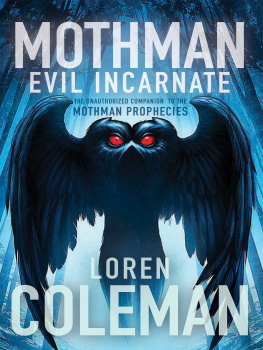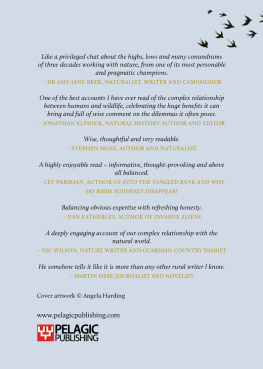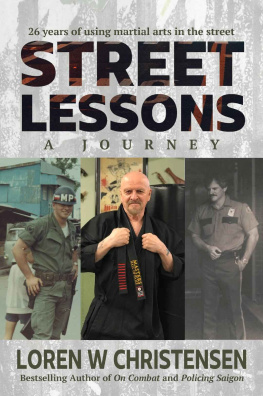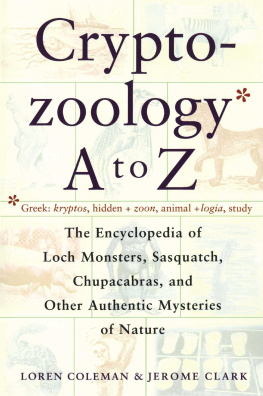Loren Eiseley - The Immense Journey: An Imaginative Naturalist Explores the Mysteries of Man and Nature
Here you can read online Loren Eiseley - The Immense Journey: An Imaginative Naturalist Explores the Mysteries of Man and Nature full text of the book (entire story) in english for free. Download pdf and epub, get meaning, cover and reviews about this ebook. year: 2011, publisher: Vintage, genre: Science fiction. Description of the work, (preface) as well as reviews are available. Best literature library LitArk.com created for fans of good reading and offers a wide selection of genres:
Romance novel
Science fiction
Adventure
Detective
Science
History
Home and family
Prose
Art
Politics
Computer
Non-fiction
Religion
Business
Children
Humor
Choose a favorite category and find really read worthwhile books. Enjoy immersion in the world of imagination, feel the emotions of the characters or learn something new for yourself, make an fascinating discovery.

- Book:The Immense Journey: An Imaginative Naturalist Explores the Mysteries of Man and Nature
- Author:
- Publisher:Vintage
- Genre:
- Year:2011
- Rating:3 / 5
- Favourites:Add to favourites
- Your mark:
- 60
- 1
- 2
- 3
- 4
- 5
The Immense Journey: An Imaginative Naturalist Explores the Mysteries of Man and Nature: summary, description and annotation
We offer to read an annotation, description, summary or preface (depends on what the author of the book "The Immense Journey: An Imaginative Naturalist Explores the Mysteries of Man and Nature" wrote himself). If you haven't found the necessary information about the book — write in the comments, we will try to find it.
The Immense Journey: An Imaginative Naturalist Explores the Mysteries of Man and Nature — read online for free the complete book (whole text) full work
Below is the text of the book, divided by pages. System saving the place of the last page read, allows you to conveniently read the book "The Immense Journey: An Imaginative Naturalist Explores the Mysteries of Man and Nature" online for free, without having to search again every time where you left off. Put a bookmark, and you can go to the page where you finished reading at any time.
Font size:
Interval:
Bookmark:
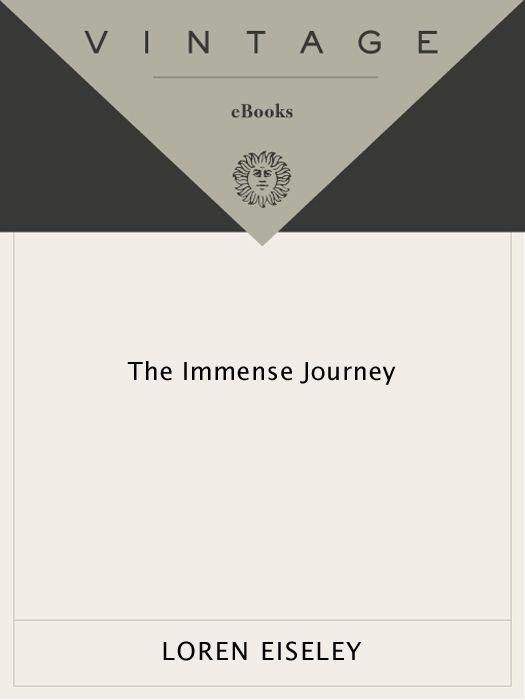
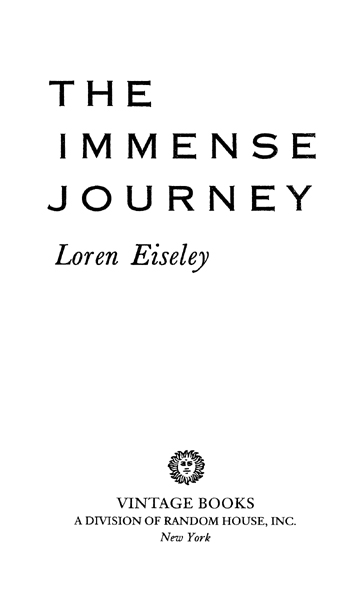
Copyright, 1946, 1950, 1951, 1953, 1956, 1957, by Loren Eiseley
All rights reserved under International and Pan-American Copyright Conventions. Published in the United States by Random House, Inc., New York, and simultaneously in Canada by Random House of Canada Limited, Toronto. Originally published by Random House, Inc., on August 6, 1957.
Library of Congress Cataloging in Publication Data
Eiseley, Loren C., 1907-1977
The immense journey.
1. Human evolution. I. Title.
GN281.E36 1973 575 72-7434
eISBN: 978-0-307-80193-7
v3.1_r1
dedicated to the memory of
CLYDE EDWIN EISELEY ,
who lies in the grass of the prairie frontier
but is not forgotten by his son
The author wishes to thank the editors of the American Scholar, Harpers Magazine, and the Scientific American for permission to reprint material which appeared separately in those publications. He would like, also, to express his gratitude to the Wenner-Gren Foundation for Anthropological Research for providing the leisure from professional duties during which a major number of the essays in this book were written.
Man can not afford to be a naturalist, to look at Nature directly, but only with the side of his eye. He must look through and beyond her.
HENRY DAVID THOREAU
Unless all existence is a medium of revelation, no particular revelation is possible.
WILLIAM TEMPLE

Some lands are flat and grass-covered, and smile so evenly up at the sun that they seem forever youthful, untouched by man or time. Some are torn, ravaged and convulsed like the features of profane old age. Rocks are wrenched up and exposed to view; black pits receive the sun but give back no light.
It was to such a land I rode, but I rode to it across a sunlit, timeless prairie over which nothing passed but antelope or a wandering bird. On the verge where that prairie halted before a great wall of naked sandstone and clay, I came upon the Slit. A narrow crack worn by some descending torrent had begun secretly, far back in the prairie grass, and worked itself deeper and deeper into the fine sandstone that led by devious channels into the broken waste beyond. I rode back along the crack to a spot where I could descend into it, dismounted, and left my horse to graze.
The crack was only about body-width and, as I worked my way downward, the light turned dark and green from the overhanging grass. Above me the sky became a narrow slit of distant blue, and the sandstone was cool to my hands on either side. The Slit was a little sinisterlike an open grave, assuming the dead were enabled to take one last lookfor over me the sky seemed already as far off as some future century I would never see.
I ignored the sky, then, and began to concentrate on the sandstone walls that had led me into this place. It was tight and tricky work, but that cut was a perfect cross section through perhaps ten million years of time. I hoped to find at least a bone, but I was not quite prepared for the sight I finally came upon. Staring straight out at me, as I slid farther and deeper into the green twilight, was a skull embedded in the solid sandstone. I had come at just the proper moment when it was fully to be seen, the white bone gleaming there in a kind of ashen splendor, water worn, and about to be ground away in the next long torrent.
It was not, of course, human. I was deep, deep below the time of man in a remote age near the beginning of the reign of mammals. I squatted on my heels in the narrow ravine, and we stared a little blankly at each other, the skull and I. There were marks of generalized primitiveness in that low, pinched brain case and grinning jaw that marked it as lying far back along those converging roads where, as I shall have occasion to establish elsewhere, cat and man and weasel must leap into a single shape.
It was the face of a creature who had spent his days following his nose, who was led by instinct rather than memory, and whose power of choice was very small. Though he was not a man, nor a direct human ancestor, there was yet about him, even in the bone, some trace of that low, snuffling world out of which our forebears had so recently emerged. The skull lay tilted in such a manner that it stared, sightless, up at me as though I, too, were already caught a few feet above him in the strata and, in my turn, were staring upward at that strip of sky which the ages were carrying farther away from me beneath the tumbling debris of falling mountains. The creature had never lived to see a man, and I, what was it I was never going to see?
I restrained a panicky impulse to hurry upward after that receding sky that was outlined above the Slit. Probably, I thought, as I patiently began the task of chiseling into the stone around the skull, I would never again excavate a fossil under conditions which led to so vivid an impression that I was already one myself. The truth is that we are all potential fossils still carrying within our bodies the crudities of former existences, the marks of a world in which living creatures flow with little more consistency than clouds from age to age.
As I tapped and chiseled there in the foundations of the world, I had ample time to consider the cunning manipulability of the human fingers. Experimentally I crooked one of the long slender bones. It might have been silica, I thought, or aluminum, or ironthe cells would have made it possible. But no, it is calcium, carbonate of lime. Why? Only because of its history. Elements more numerous than calcium in the earths crust could have been used to build the skeleton. Our history is the reasonwe came from the water. It was there the cells took the lime habit, and they kept it after we came ashore.
It is not a bad symbol of that long wandering, I thought againthe human hand that has been fin and scaly reptile foot and furry paw. If a stone should fall (I cocked an eye at the leaning shelf above my head and waited, fatalistically) let the bones lie here with their message, for those who might decipher it, if they come down late among us from the stars.
Above me the great crack seemed to lengthen.
Perhaps there is no meaning in it at all, the thought went on inside me, save that of journey itself, so far as men can see. It has altered with the chances of life, and the chances brought us here; but it was a good journeylong, perhapsbut a good journey under a pleasant sun. Do not look for the purpose. Think of the way we came and be a little proud. Think of this handthe utter pain of its first venture on the pebbly shore.
Or consider its later wanderings.
I ceased my tappings around the sand-filled sockets of the skull and wedged myself into a crevice for a smoke. As I tamped a load of tobacco into my pipe, I thought of a town across the valley that I used sometimes to visit, a town whose little inhabitants never welcomed me. No sign points to it and I rarely go there any more. Few people know about it and fewer still know that in a sense we, or rather some of the creatures to whom we are related, were driven out of it once, long ago. I used to park my car on a hill and sit silently observant, listening to the talk ringing out from neighbor to neighbor, seeing the inhabitants drowsing in their doorways, taking it all in with nostalgiathe sage smell on the wind, the sunlight without time, the village without destiny. We can look, but we can never go back. It is prairie-dog town.
Font size:
Interval:
Bookmark:
Similar books «The Immense Journey: An Imaginative Naturalist Explores the Mysteries of Man and Nature»
Look at similar books to The Immense Journey: An Imaginative Naturalist Explores the Mysteries of Man and Nature. We have selected literature similar in name and meaning in the hope of providing readers with more options to find new, interesting, not yet read works.
Discussion, reviews of the book The Immense Journey: An Imaginative Naturalist Explores the Mysteries of Man and Nature and just readers' own opinions. Leave your comments, write what you think about the work, its meaning or the main characters. Specify what exactly you liked and what you didn't like, and why you think so.

